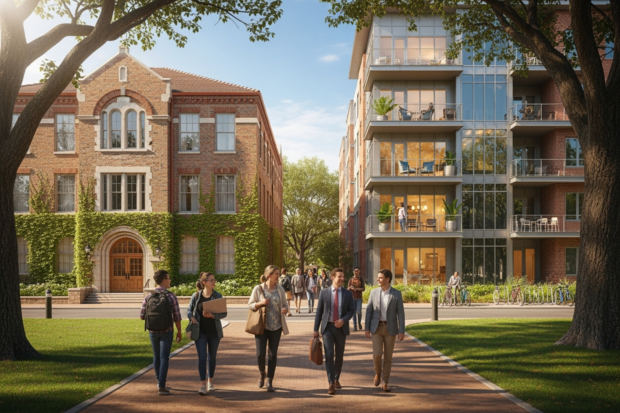Your Academic Housing Journey Starts Here
Campus housing options come in many forms, from traditional residence halls to independent rentals, each designed to meet different academic needs and lifestyles. Whether you’re a graduate student, post-doc, visiting scholar, or faculty member, understanding your choices helps you find the perfect home base for your academic work.
Main Campus Housing Options:
- University-managed housing – Traditional dorms and suites for undergraduate students, graduate apartments, and some faculty housing
- Independent rentals – Private apartments, furnished homes, and flexible lease arrangements
- Academic home exchanges – Swapping homes with other scholars through trusted platforms
- Short-term solutions – Temporary furnished housing for research trips, fellowships, relocations and sabbaticals
Most universities offer multiple housing types, with facilities ranging from basic residence halls to fully-equipped family apartments. For example, UC Berkeley provides housing across 8 residence hall complexes and 12 apartment complexes, while larger systems like SDSU accommodate over 8,500 residents across 25 buildings with 22 specialized learning communities.
Typical costs vary widely by location and housing type. University housing often includes utilities, internet, and sometimes meal plans, while independent rentals may offer more flexibility in terms and pricing. Application deadlines are crucial – many universities have priority deadlines in April or May for the following academic year.
The key is matching your housing choice to your academic goals, budget, and lifestyle preferences. Some scholars prefer the convenience and community of university housing, while others value the independence and flexibility of private rentals.
Since 2000, SabbaticalHomes has been a trusted resource for academics and scholars seeking affordable, short-term furnished housing options, leveraging expertise to address the unique challenges of finding reliable accommodation.
Understanding Housing Options for Academics: From University-Managed to Independent Solutions
When you’re starting on an academic journey – whether it’s for a new fellowship, a research trip, or a sabbatical – finding the right housing can feel overwhelming. We understand that a comfortable and conducive living environment is essential for productive work. That’s why we’re here to make the housing challenge easier for the higher education workforce, allowing our community to focus more on their work and passions.
The landscape of campus housing options is refreshingly diverse, encompassing everything from university-managed facilities to independent solutions. Each type offers distinct advantages and caters to different needs, especially for graduate students, post-docs, faculty, and visiting scholars who often require more specialized accommodations than traditional undergraduate dorms.

University-Managed Housing: What to Expect
University-managed housing goes far beyond the classic dormitory experience most people remember from their undergraduate days. While institutions do still operate traditional residence halls, they’ve evolved to offer a much broader spectrum of accommodations for their diverse academic community.
Traditional residence halls remain the backbone of campus housing, though they’re primarily designed for undergraduates. These classic dormitory settings typically feature double or triple rooms with communal bathrooms and shared lounges. The University of Cincinnati’s traditional rooms accommodate 2, 3, or 4 beds, with halls like Calhoun and Dabney offering this community-focused style. At Hanover College, first-year halls like Blythe and Donner house 40 and 120 students respectively, with average room sizes around 13′ x 13′. While these spaces foster community, they may feel limiting for graduate students or visiting scholars who need more privacy and workspace.
Suite-style living offers a perfect middle ground between community and privacy. These arrangements typically consist of multiple bedrooms sharing a common living area and a private bathroom. The University of Cincinnati provides Junior Suites with 4-person, 2-bedroom setups and various suite configurations ranging from 2-person to 7-person arrangements. Transylvania University’s Thomson Residence Hall features 31 suite-style living units, complete with living rooms and study areas – ideal for academics who need dedicated spaces for reading and writing.
For those seeking more independence, university-owned apartments provide a home-like experience with private bedrooms, full kitchens, and often in-unit laundry facilities. The University of Louisville offers apartment-style housing like University Tower Apartments with 200 beds and Cardinal Towne, which include in-unit kitchens and washer/dryers. UC Berkeley houses residents across 12 apartment complexes, including specialized options like xučyun ruwway for graduate students and Helen Diller Anchor House for transfer students. UT Dallas provides both furnished options at Canyon Creek Heights and unfurnished apartments at University Village.
Graduate and family housing recognizes that academic life often extends beyond the traditional student experience. Many universities offer dedicated housing for graduate students, faculty with families, and visiting scholars. The University of Pittsburgh provides university-owned housing specifically for graduate students, medical students, dental students, and pharmacy students, with studio, 1, 2, and 3-bedroom apartments. UC Berkeley’s University Village complex caters specifically to families, understanding that academic pursuits often involve spouses and children.
Some institutions even offer faculty housing for professors, visiting scholars, or post-docs, making relocation easier and fostering an academic community on campus. While less common, these options can be incredibly convenient for temporary academic stays or sabbaticals.
The social and community aspects of university-managed housing often prove invaluable. Many halls employ Resident Assistants who organize events and foster belonging. SDSU operates 22 learning communities designed to integrate academic and social life seamlessly. However, academics may find limitations in terms of privacy, stricter institutional rules, and living environments primarily designed for younger students.
Independent and Community-Based Housing Solutions
For academics seeking more autonomy, space, or a different living experience, independent housing solutions offer compelling alternatives. This is where the real flexibility begins, and where platforms like SabbaticalHomes.com truly shine in connecting minds on the move with suitable homes worldwide.
Private rentals encompass apartments, houses, and rooms rented directly from private landlords or through real estate agencies. They offer tremendous flexibility in location, size, and amenities. Near major universities, thousands of private rentals provide options with individual locking bedrooms, private bathrooms, and dedicated study spaces – perfect for academics who need quiet, focused environments.
Furnished apartments eliminate the hassle of moving furniture, making them ideal for temporary academic stays. Many private housing providers offer fully furnished units with all-inclusive rent covering utilities and internet. These properties often provide flexible lease terms, sometimes from 1 to 12 months, specifically catering to students and academic interns. This flexibility aligns perfectly with academic calendars and research timelines.
Home exchanges represent a unique and often cost-effective option where academics swap homes with colleagues at other institutions. This arrangement allows scholars to live like locals while saving on accommodation costs and exploring new academic environments. It’s particularly popular among sabbatical-bound faculty and researchers conducting fieldwork abroad.
Short-term and flexible leases address one of academia’s biggest housing challenges. Traditional rental agreements often require year-long commitments, which can be problematic for sabbaticals, fellowships, or research trips lasting just a few months. Independent options specialize in accommodating academic schedules, offering lease terms that match semester breaks, summer research periods, or conference seasons.
SabbaticalHomes.com stands out as a trusted platform designed specifically for the academic community. Our curated selection of furnished homes for rent or exchange connects scholars directly, fostering a community built on trust, privacy, respect, and diversity. Members find homes with dedicated offices, easy commutes to campus and libraries, and quiet spaces ideal for writing retreats. This makes it a practical and flexible resource for relocations, research trips, writing retreats, fellowships, and internships – exactly what today’s mobile academic workforce needs.

The beauty of independent housing lies in its adaptability to academic life’s unique rhythms. Whether you’re a post-doc needing a quiet space for data analysis, a visiting scholar requiring proximity to specific libraries, or a faculty member on sabbatical seeking inspiration in a new environment, independent housing solutions can be custom to support your academic goals in ways that traditional campus housing often cannot.
Related: Key Information about SabbaticalHomes
What’s Included? Amenities, Costs, and Eligibility for Academic Housing
When exploring campus housing options, understanding what you’re actually getting for your money makes all the difference. The monthly rent is just the beginning—the real value lies in the amenities, services, and support that come with your new home away from home.

Common Amenities and What to Expect
Most academic housing comes with thoughtfully chosen amenities designed to support your work and daily life. The standard furnishings typically include everything you need to move in and start working immediately. You’ll find a bed (often a Twin XL mattress in university housing), a desk and chair for your research, a dresser, and a wardrobe. Hanover College, for example, ensures every room includes these essentials plus additional conveniences.
High-speed internet is absolutely essential for academic work, and you’ll be relieved to know it’s included in virtually all housing options. Whether you’re accessing research databases, attending virtual conferences, or collaborating with colleagues worldwide, reliable connectivity is guaranteed. Many universities also provide free TV channels through services like SpectrumU.
Laundry facilities vary depending on your housing type. Apartment-style accommodations often feature in-unit washers and dryers, while traditional residence halls typically offer communal laundry rooms on each floor or in the building. Independent rentals found through SabbaticalHomes.com often include laundry facilities as part of their furnished offerings.
Kitchen access can dramatically impact your daily routine and budget. Traditional dorms might only offer communal kitchens on each floor, while suites often include efficiency kitchens with a sink, microwave, and mini-fridge. University-owned apartments and independent rentals usually feature full, private kitchens where you can prepare meals and host colleagues.
Academic work requires quiet, focused environments, which is why many housing options include dedicated study spaces. University-managed buildings often feature communal study lounges or quiet areas, while private rentals might offer dedicated office spaces—a particularly valuable feature for scholars who need a professional workspace at home.
Fitness centers are increasingly common in larger housing complexes, helping you maintain your physical health during intense academic periods. Security features like controlled access, 24-hour security, and key fob entry provide peace of mind, especially in urban campus settings.
Accessibility features are a priority for modern housing providers. Universities are committed to providing ADA-compliant rooms, elevators, and pathways. If you have specific accessibility needs, institutions like the University of Pittsburgh encourage contacting their Disability Resources & Services office early in the application process.
The Financial Picture: Rates, Fees, and Meal Plans
The true cost of campus housing options extends beyond the advertised monthly rate, but understanding the full picture helps you budget effectively and avoid surprises.
Housing rates can be structured per-semester or monthly, varying significantly based on location, room type, and included amenities. For example, in a major city, a furnished room in a shared academic-focused apartment might range from $950-$1,100 per person, while a private studio could cost $1,450-$1,850 per person. These rates often reflect the premium for furnished, all-inclusive living in a prime academic location.
Application fees are common across university housing systems. The University of Utah charges a $130 application fee for first-year housing, while private rentals may include application or background check fees. These are typically non-refundable, so factor them into your initial housing budget.
Security deposits are standard practice and usually refundable at the end of your lease, provided there’s no damage to the property. This protects both you and the property owner, creating a foundation of mutual trust.
Optional meal plans can significantly impact your total housing costs. While often mandatory for first-year students in university housing, they’re typically optional for graduate students and visiting scholars. The University of Utah notes that all matriculated students can purchase meal plans regardless of where they live, offering flexibility for those who prefer some meals prepared.
All-inclusive pricing is increasingly popular, especially in dedicated student apartment complexes and private rentals. This approach covers utilities (gas, water, electricity, heat), internet, and sometimes furnishings in one monthly payment, dramatically simplifying your budgeting. This all-inclusive approach eliminates the stress of setting up multiple utility accounts.
Transparent costs on SabbaticalHomes.com represent a refreshing approach to academic housing. Hosts and guests communicate directly, allowing for honest discussions about all costs upfront. There are no hidden fees or third-party booking charges—we believe in treating people as people, not as a profit center.
Who is Eligible for Different Housing Options?
Eligibility for campus housing options varies based on your academic status and career stage, but there are accommodations for virtually every type of scholar.
First-year students often have specific requirements, with many universities maintaining live-on policies for incoming students. Hanover College requires students to live on campus for all four years, with limited exceptions, creating a close-knit academic community.
Upperclassmen typically have more flexibility, with many universities offering dedicated housing in suite-style or apartment-style accommodations. These options provide more independence while maintaining campus connections.
Graduate students, post-docs, and visiting scholars represent a key demographic for specialized housing solutions. Universities like the University of Pittsburgh offer specific housing for graduate students, medical students, dental students, and pharmacy students. UC Berkeley provides graduate student apartments, while UT Dallas accommodates everyone from sophomores through graduate students. SabbaticalHomes.com is perfectly designed for these “minds on the move” who need temporary, furnished housing that supports their academic work.
Transfer students have unique needs that some universities are beginning to address. UC Berkeley has introduced apartment communities specifically for transfer students, like Helen Diller Anchor House, recognizing that these students need different support than traditional first-years.
Students with families face particular challenges in finding suitable housing. Universities like UT Dallas and UC Berkeley offer limited family housing facilities, typically allocated on a first-come, first-served basis. However, independent rentals found through SabbaticalHomes.com often provide more spacious and flexible options for scholars with spouses and children, offering the space and privacy that families need.
University affiliates including staff and researchers may also be eligible for certain housing options. The University of Pittsburgh includes “University Affiliate” as an eligible population for some university-owned housing, recognizing that the broader academic community benefits from convenient housing options.
For detailed information about specific eligibility requirements, consult university housing departments directly. Resources like the University of Pittsburgh’s housing for medical and graduate students provide comprehensive overviews of available options and application processes.
The Application Process: Navigating Steps and Deadlines
Securing your ideal academic home requires understanding and navigating the application process, which can vary significantly between university-managed and independent housing. The good news? Once you know what to expect, the process becomes much more manageable.

The Typical Application Process
When applying for university-managed housing, you’ll typically start by creating a profile on the institution’s housing portal. For on-campus housing, Most universities have moved to digital platforms that streamline the entire process – you can see an example at MyHousing UT Dallas. Here, you’ll submit your personal information, indicate your preferences, and often pay an application fee.
If you’re open to sharing your space, many universities offer roommate matching surveys. These questionnaires help match you with compatible individuals based on lifestyle habits, study preferences, and personal quirks. Some students find lifelong friends this way, while others simply find someone who respects their need for quiet study time.
The experience is quite different for grad, post-grad students and faculty and staff. When using SabbaticalHomes.com, our platform facilitates direct communication with hosts, allowing for personalized discussions about your specific needs, preferences, and lease terms. There’s no impersonal application system – instead, you can browse listings, review details, and reach out to hosts directly to discuss availability and suitability.
This flexible arrangement approach means you have the independence to make your own housing arrangements. Since we serve as a matching service rather than a booking platform, members can foster more personal connections and negotiate terms that work for their unique academic situations.
Key Dates and Deadlines You Can’t Miss
Timing is everything when it comes to securing the best campus housing options. Missing a deadline doesn’t just mean inconvenience – it can mean missing out on your preferred housing entirely.
Application opening dates vary by institution, but they’re typically announced well in advance. The University of Utah’s first-year student application opens in January, and applying early determines your reservation time and significantly increases your chance of guaranteed housing. Mark these dates in your calendar and set reminders.
Priority deadlines are absolutely crucial for securing desired accommodations. UC Berkeley’s application deadline for first-years is May 16, while transfers have until June 2. UT Dallas sets their first-year priority application deadline at April 15. These aren’t suggestions – they’re hard stops that can determine whether you get your first choice or end up on a waitlist.
Move-in dates are carefully orchestrated events, often staggered by hall or floor to prevent chaos. UT Dallas’s Fall 2024 move-in dates span several days in mid-August, giving each group a specific window. You’ll receive detailed instructions about your assigned time, what to bring, and what to expect.
For current residents, renewal deadlines ensure you can stay in your current housing for another academic year. The University of Cincinnati’s February 6 “Intent to Renew” deadline is typical – miss it, and you’ll need to reapply through the general process.
Planning ahead for academic calendars is essential. Academic schedules don’t always align with traditional lease cycles, which is where SabbaticalHomes.com truly shines. Our platform specializes in flexible arrangements that accommodate sabbaticals, research trips, fellowships, and other academic pursuits that don’t fit neatly into semester schedules.
The key to success is staying organized, submitting applications promptly, and having backup plans. Whether you choose university-managed housing or independent options through SabbaticalHomes.com, understanding the process and respecting deadlines will help you secure the ideal academic home for your scholarly journey.
Weighing Your Housing Options: Campus-Managed vs. Independent Living
The central question for many academics is whether to choose university-managed housing or an independent living arrangement. This decision often comes down to balancing convenience with independence, considering proximity to work, and finding the right lifestyle fit for your academic journey.
For scholars navigating this choice, understanding the trade-offs between structured university housing and flexible independent options can make all the difference. Whether you’re starting a sabbatical, beginning a new fellowship, or starting on a research trip, the right housing choice supports your academic goals while providing the comfort and functionality you need.
| Feature | University-Managed Housing | Independent Housing (SabbaticalHomes.com) |
|---|---|---|
| Cost | Often includes utilities and amenities in one price | Flexible pricing with transparent, direct negotiations |
| Convenience | Simplified billing, maintenance handled by university | Direct communication with hosts, personalized arrangements |
| Amenities | Standard furnishings, campus facilities access | Varied options from basic to luxury, often with dedicated offices |
| Flexibility | Fixed lease terms aligned with academic calendar | Customizable lease lengths, perfect for sabbaticals and research trips |
| Community | Built-in academic community, organized events | Connect with like-minded hosts and fellow academics globally |
The Benefits of University-Managed Housing
University-managed housing offers undeniable advantages for academics who value proximity and simplicity. When your lab is a five-minute walk away and the library is just across the quad, the convenience factor becomes compelling. You’ll find yourself with more time for research and less time commuting.
The financial aspect often proves straightforward too. Simplified billing means one payment covers your rent, utilities, and often internet access. No surprise electricity bills or debates about splitting the cable cost. University-managed maintenance takes care of everything from leaky faucets to heating repairs, letting you focus on your work rather than household logistics.
Perhaps most valuable is the built-in community aspect. Living among fellow academics, graduate students, and visiting scholars creates natural opportunities for collaboration and intellectual exchange. Many university housing complexes organize social events, creating connections that can improve both your personal experience and professional network.
The Advantages of Independent Housing (SabbaticalHomes.com)
Independent housing through SabbaticalHomes.com opens up a world of possibilities that university-managed options simply can’t match. The greater independence allows you to choose your living situation based on your specific needs rather than institutional constraints.
Diverse housing choices become available when you’re not limited to university-owned properties. You might find a charming cottage perfect for a writing retreat, a modern apartment with a dedicated home office, or a family-friendly house with space for visiting relatives. The variety ensures you can find something that truly fits your lifestyle and work requirements.
Flexible lease terms prove especially valuable for academics whose schedules don’t align with traditional rental periods. Whether you need housing for a three-month research stint or a full sabbatical year, SabbaticalHomes.com connects you with hosts who understand academic timelines and can accommodate your specific dates.
The potential for cost savings often surprises academics. Direct negotiations with hosts can result in more affordable arrangements than university housing, especially for longer stays. Plus, you’re not paying for amenities you don’t use or services you don’t need.
Choosing your own living companions becomes possible when you’re not assigned to university housing. You can seek out quiet environments for focused research, social settings for collaboration, or private spaces for writing and reflection.
Many listings specifically cater to academic needs, featuring dedicated office spaces that university housing rarely provides. Having a proper workspace can dramatically improve your productivity and work-life balance.
The international reach of SabbaticalHomes.com means you can find suitable housing anywhere your research takes you. From a London flat near the British Library to a Sydney apartment walking distance from the university, the platform connects you with hosts worldwide who understand academic needs.
For academics seeking housing that truly supports their work and lifestyle, exploring academic rental listings reveals options that university-managed housing simply cannot provide. The flexibility, variety, and personal touch of independent housing often prove invaluable for scholars who want their living situation to improve rather than constrain their academic pursuits.
Let us know what you think! Connect with us on X, LinkedIn, Facebook, Instagram, YouTube and Pinterest.


